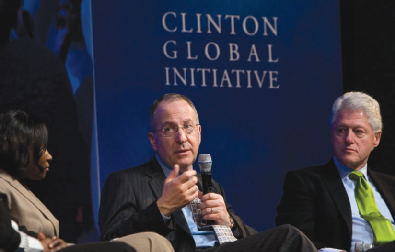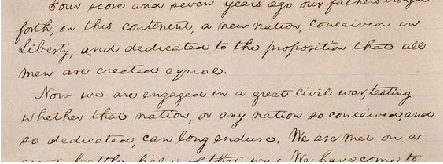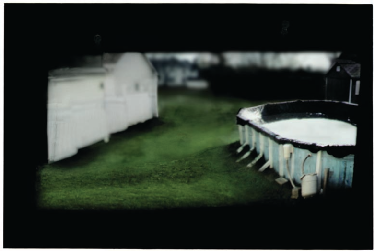Provost Rips Rankings : Freshmen Read Lincoln : Smoke & Fire : Campus Crime : Astronaut Low Dies : Top Jobs Filled : Battling Wheat Plague : Biz Major Ranked Fourth 
Skorton on Activism
President Skorton spoke at the inaugural meeting of the Clinton Global Initiative University, held in New Orleans in March. The meeting, hosted by former U.S. President Bill Clinton, brought together students, university presidents, and activists to discuss such issues as energy, climate change, health, and poverty. In a panel discussion that included Clinton and cyclist Lance Armstrong, Skorton described a four-step program for activism: listening and learning about a problem, committing to an action plan, doing as much as you can on your own, and seeking out other organizations and resources. Said Skorton: "All of us have an obligation to act in the public interest."
Provost Rips Rankings
In her second Academic State of the University Address, titled "Questions of Value," Provost Biddy Martin cast a critical eye on college rankings and declared that "we can worry about our rankings, or we can be who we are." The address—delivered on March 5 to an audience of trustees, administrators, faculty, and a few students—began with a look at a 2005 evaluation of "global universities" published in the Economist. Cornell ranked twelfth on that list. Martin then moved on to the most recent U.S. News & World Report ranking, where Cornell also placed twelfth. She pointed out the strong correlation between wealth, as measured in endowment per student, and the positions of the top twenty schools on the U.S. News list, and said that rather than worrying about its position in such polls, Cornell should "define value in our own terms."
Those terms, Martin explained, involve doing what the University thinks is right and in accordance with its founding principles, as expressed in such decisions as the recently announced improvements in financial aid for lower-income families. Such positive moves are being made more difficult by recent government actions, she contended, especially cuts in financial support combined with pressure for more endowment funds to be channeled into financial aid. Cornell, Martin said, needs to engage government officials on the negative implications of such actions for both teaching and research.
Freshmen Read Lincoln

The book for next year's New Student Reading Project is Lincoln at Gettysburg: The Words That Remade America, a Pulitzer Prize winner by Garry Wills. The selection was announced by vice provost for undergraduate education Michele Moody-Adams, who said it was chosen for its reflections on American history and national issues of race, leadership, and war. The choice also emphasizes the connection between Lincoln and Cornell, which was founded as a result of the president's commitment to the Morrill Act creating land-grant universities. The Cornell archive houses one of five known handwritten copies of the Gettysburg Address.

Great white Weill: Construction continues on Weill Hall, the new life sciences technology building. The $162 million, 250,000-square-foot structure is scheduled for completion this summer. It will house labs and classrooms in the biological, physical, engineering, computational, and social sciences.
Smoke & Fire
In March, the New York Times reported that a major study on early lung cancer detection by a prominent researcher at Weill Cornell Medical College was partly financed by a tobacco company—and implied that the funding source was intentionally concealed. Radiologist Claudia Henschke, MD, led the study, which found that 80 percent of lung cancer deaths could be prevented through the widespread use of CT scans for former smokers and others at high risk. The results were published in the New England Journal of Medicine in 2006, with a notation that the Foundation for Lung Cancer: Early Detection, Prevention & Treatment supported the project. The Times story reported that the foundation, a little-known and hastily organized charity, received $3.6 million from the Vector Group, the parent company of Liggett Tobacco. Henschke is the foundation's president; its directors include Weill Cornell dean Antonio Gotto.
Weill Cornell responded with a statement that it never concealed the gift, which was disclosed in an earlier press release—and that Vector had no control over the study or its results. "The gift was used appropriately and responsibly for the public good," the Medical college said. However, the journal's editor in chief told the Times that if the funding source had been known, the article would not have been published. In an editorial, the Daily Sun decried the University's willingness to accept tobacco money regardless of whether Vector's donation affected the study. "The fact remains that gifts from Big Tobacco are essentially blood money," the Sun said. "Any gift from a tobacco company is money that was made on the lives, addictions, and subsequent deaths of millions of people worldwide."
Campus Crime
In April, the Cornell Police announced that it would increase security for the rest of the semester in response to recent crimes in and around campus, including a string of burglaries over spring break and three armed robberies that took place the following week in Collegetown and at a fraternity house. Most of the crimes have resulted in arrest or indictment, but as of mid-April one suspect remained at large with a warrant issued for his arrest.
 Freeze frame: Top honors in the inaugural Margaret Bourke-White Photography Portfolio Prize, including a $7,500 cash award, went to MFA candidate Lindsay Glover for "Hollowed Out." The series of photos (including Number Six, above) will be on display outside President Skorton's Day Hall office through May. Bourke-White graduated from Cornell in 1927.
Freeze frame: Top honors in the inaugural Margaret Bourke-White Photography Portfolio Prize, including a $7,500 cash award, went to MFA candidate Lindsay Glover for "Hollowed Out." The series of photos (including Number Six, above) will be on display outside President Skorton's Day Hall office through May. Bourke-White graduated from Cornell in 1927.
Astronaut Low Dies
G. David Low '80, an astronaut who carried Ezra Cornell's silk wedding socks into space during his first shuttle mission in 1990, died March 15 from colon cancer. He was fifty-two. Low served in the space program for twelve years, circling the Earth more than 540 times on three missions. In 1991, he brought another Ezra relic into space—the letter the founder wrote to his granddaughter expressing his wish that the University be coeducational. Low, who later became an executive in the space industry, is survived by his wife and three children.
 Top Jobs Filled
Top Jobs Filled
Several administrators shifted positions this spring, as the dean of the faculty announced his retirement and the Johnson School and library system got new leaders, both of whom had been in the posts in an interim capacity. Current faculty dean Charles Walcott, PhD '59, a professor of neurobiology and behavior, will retire from the University when his term ends June 30. He'll be succeeded by William Fry, PhD '70, a professor of plant pathology who has taught on the Hill since 1971. The Johnson School announced that Joe Thomas, the Noyes professor of manufacturing, has been named its new dean. And Anne Kenney, a pioneer in digitizing library materials, is the new University Librarian, overseeing two dozen Cornell libraries in Ithaca, Geneva, New York City, and Qatar.
Battling Wheat Plague
The Gates Foundation has awarded Cornell a $26.8 million grant to launch the Durable Rust Resistance in Wheat project, an international partnership of fifteen institutions working to combat stem rust, a virulent fungus that causes wheat to break and shrivel. Directed by plant breeding professor Ronnie Coffman, PhD '71, the project will focus on developing improved rust-resistant varieties of wheat, containing outbreaks, and protecting resource-poor farmers in developing countries from losing their crops. Partners include organizations in Kenya, Ethiopia, and Syria.
Biz Major Ranked Fourth
BusinessWeek has ranked Applied Economics and Management, Cornell's undergraduate business program, as fourth-best in the nation, rising six spots from last year. The survey looked at such elements as enrollment, cost, average SAT score, academic quality, and facilities. The magazine ranked Cornell's MBA program thirteenth in graduate-level business education; the Executive MBA program was also named thirteenth. U.S. News & World Report also released its grad rankings this spring, naming the Johnson School twelfth. Other top-ranked programs included computer science (sixth), physics (seventh), engineering (ninth), law (twelfth), and math (thirteenth).


